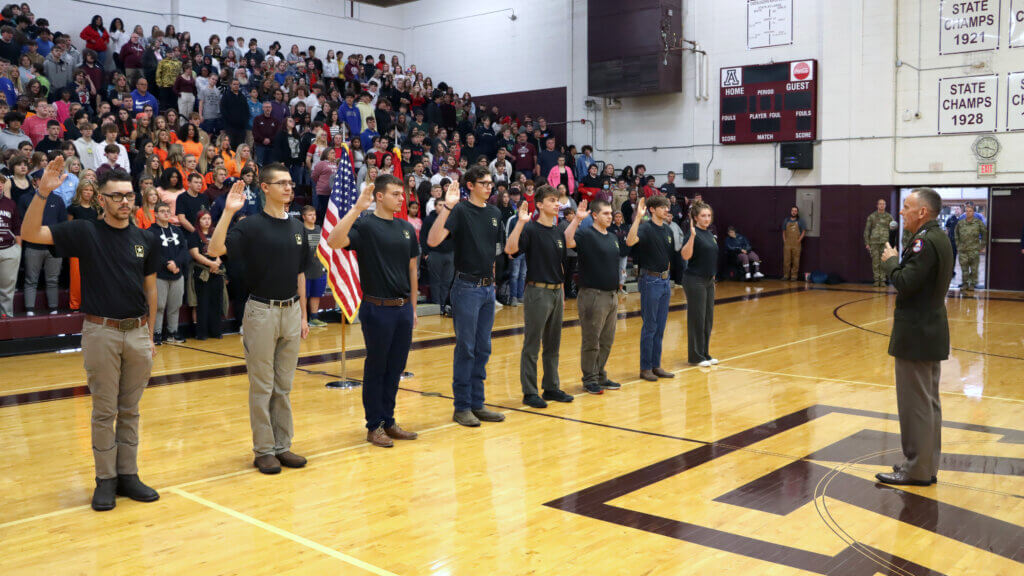When Bill Merck joined the Army in 1969, it was largely a matter of controlling his own destiny.
“The draft was in play, Vietnam was going on,” said Merck, who, shortly after earning his master’s degree, received his draft notice. “I was a little older, around 23, (so) I decided I wanted to be an officer.”
The experience, though short-lived, was transformative for Merck, who after military service rose to senior executive ranks in higher education and authored books on a life of leadership. He’s confident military enlistment offers life-changing promise for rising generations today, as well – if only we can learn to reach them.
“I was in the Army for three years and it was an incredibly good experience for me,” Merck said. “We need to help these young people understand what they can gain through military service.”
The Armed Forces’ recent struggles in recruiting and retaining qualified personnel is well-documented. In July, Army Secretary Christine Wormuth conceded during congressional testimony that the Army would undoubtedly fall short of its “stretch goal” of 65,000 recruits for the year. Little wonder, really, given that less than a quarter of 17- to 24-year-olds meet physical or academic enlistment standards.
“The bar to get into the military is high,” wrote retired Navy Adm. James Stravidis in a July 2023 analysis piece for The Washington Post. “The Pentagon is competing with universities and the private sector for a small segment of each year’s high school graduates.”
Merck believes, however, that some of the struggles can also be traced to a misunderstanding on what makes Generation Z tick, arguing that it’s more than college money and 401ks.
“The conversation often circles around pay, because there’s a financial insecurity around Gen Zers,” said Merck. “(But) a lot of what the Army has to offer a young person never gets discussed.”
Merck recalls how after exiting the military, he applied for a leadership position with Madison College (now James Madison University), but it became apparent after interviewing he probably didn’t qualify for the gig. But after a couple years as a platoon leader, Merck wasn’t about to surrender to fate.
“This is where my military experience came in,” said Merck, referencing the well-tested maxim of “improvise, adapt, and overcome.”
Merck had learned that the hiring official, himself a retired Army colonel, had just inherited oversight of student housing. Sensing he was eager to delegate the responsibility, Merck proactively offered to take it off his plate, boldly urging the colonel to test his mettle.
“He called me the next day and offered me a job,” said Merck.
That “military mindset,” the belief “you can do a lot more than you think you can do,” said Merck, is a “mental toolkit” the military gifts to service members willing to embrace it. “But that’s not really sold in the recruiting process, those intangible benefits.”
Another omission on the part of recruiters and military marketers, said Merck, is underestimating how activism and sense of purpose are driving forces for many in Gen Z. According to a 2021 study by Edelman, a leading PR and research firm, about 70 percent of Gen Zers are involved in political or social causes, and only about 1 in 5 say they can work for an organization that doesn’t align with their values.
“They want to know ‘Why are we doing this?’” said Merck. “I don’t think the military is doing a very good job of explaining why a strong military is so important.”
As “digital natives,” Gen Z is saturated with politicized misinformation, he explained, but often lack the life experience to grasp the importance of a robust military. To get to the “why” behind enlisting, there’s an education that must occur for both the recruit and the parents at home.
“A lot of these things gets misinterpreted to make political points,” he said, challenging the idea that transgenderism, wokeness, and CRT, for example, have a significant impact on today’s Armed Forces. “It’s not really on the radar of an 18-year-old. But the parents soak in some of this stuff, the kids start to wonder about what their parents are so disparaging about. It’s more politics than reality.”
Democracy and human rights, however, remain at the center of military service, Merck said, and he believes it’s a selling point for a conscientious generation that demands their work has meaning.
“They don’t fully understand how important it is to have freedom, to have a democracy (because) they haven’t had the contrasting experience,” Merck said. “Some of this needs to be explained in the marketing of why it’s important to join the military.”

